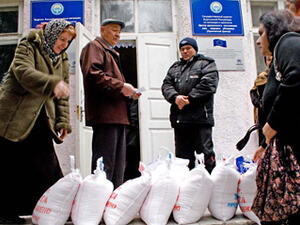Number of Burundian returnees helped by UNHCR tops 350,000
Number of Burundian returnees helped by UNHCR tops 350,000

Young Burundian refugees at a transit centre in Ruyigi province after returning home from Tanzania.
BUJUMBURA, Burundi, August 15 (UNHCR) - The number of Burundian refugee returnees assisted by UNHCR over the past five years has topped the 350,000 mark. The UN refugee agency helped some 270,000 return home on buses and trucks under one of the agency's biggest repatriation programmes in Africa, while it has also assisted some 80,000 who returned to Burundi on their own.
The 350,000 landmark was passed on Tuesday, when convoys carrying more than 1,500 refugees crossed the border with Tanzania and arrived at three UNHCR transit centres in the provinces of Makamba, Ruyigi and Muyinga.
The refugee agency has also helped in the reintegration of tens of thousands of the returnees by funding housing schemes, legal assistance programmes and the reconstruction of clinics and health centres.
The pace of returns this year has increased since July, when UNHCR introduced a cash grant of 50,000 Burundian francs (US$45) to each returnee to help them get started once back in Burundi.
The World Food Programme (WFP) planned on Wednesday to raise its food assistance to returnees from a four-month pack to supplies for six months. Officials from UNHCR and WFP said the cash grant and increased food packages could help boost repatriation figures and urged donor support.
Some 12,300 Burundians have returned home this year, more than 8,000 since July. UNHCR plans to repatriate some 65,000 during the whole year, including 60,000 from camps in the main host country, Tanzania. There are also large numbers in Rwanda and the Democratic Republic of the Congo.
Those returning on Tuesday received the first instalment of the UNHCR cash grant as well as non-food items such as blankets, jerry cans, plastic sheeting, tools and seeds. They also got food packages from WFP. They were due to undergo health screening and receive a hot meal before travelling on to their home villages on trucks provided by UNHCR's government partner, PARESI.
The UN refugee agency began to facilitate the repatriation of Burundian refugees in April 2002 and has actively promoted repatriation since June 2006 as the security situation continued to improve. But reintegration is hard for many returnees because years of war have devastated infrastructure and disrupted services.
Last March, UNHCR and WFP released a joint study about the situation of returnees in 10 provinces. Almost all the refugees questioned said they did not regret their decision to return but many complained about lack of food, bad shelter conditions, lack of health care and difficulties related to access to land.
"It is very encouraging to see that local communities are welcoming and supporting the returnees, many of whom have lived in exile since 1993. There are only a few cases of discrimination against them," said Bo Schack, UNHCR representative in Burundi.
But he called for greater international efforts to improve socio-economic conditions in Burundi and so help ensure the sustainability of return. "The extreme poverty in many areas of return remains a big challenge. These are important development needs which go far beyond UNHCR's limited resources for humanitarian needs," Schack said.
To support integration in the longer term, UNHCR is providing building materials to vulnerable returnee families. More than 51,000 houses have been built since 2003 with the agency's help and another 6,750 will be finished this year. UNHCR also rehabilitated 13 health centres and built or renovated some 500 classrooms in areas of return between 2002 and 2006.
UNHCR and some of its non-governmental partners have put in place a monitoring and legal assistance network to verify that returnees have access to their property and are not threatened or discriminated against once they are back in their villages.
The return movement to Burundi has led to a substantial reduction in the size and number of refugee camps in Tanzania, which now hosts less than 150,000 Burundian refugees in just four camps. In 2002, more than 500,000 Burundians lived in 10 camps just inside Tanzania.
The Tanzanian government estimates that a further 200,000 live in settlements outside the camps. Most fled Burundi after the internal conflict of 1972 and only a few of them have returned.
By Andreas Kirchhof in Bujumbura, Burundi









